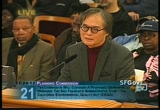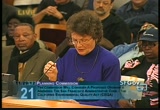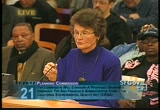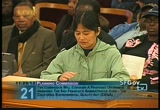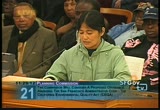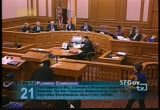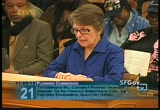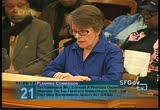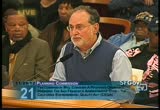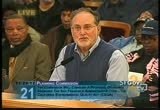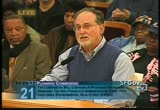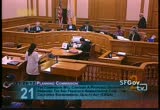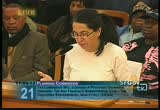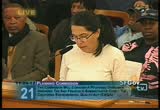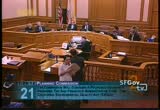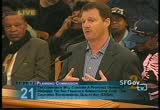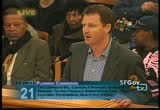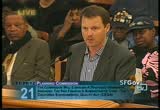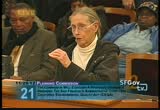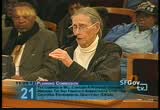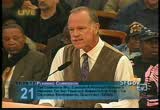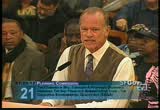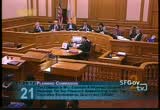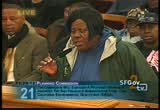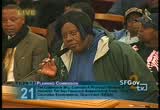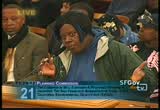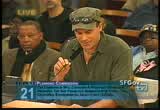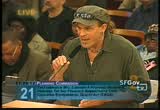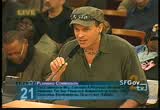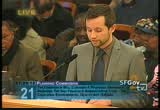tv [untitled] November 29, 2012 4:30pm-5:00pm PST
4:30 pm
scheduled that's developed by project managers and architects to anticipate all the parks [speaker not understood] in the project. and they all have to be met and they usually are. and c-e-q-a is only a very small part of that. thank you. >> thank you. good afternoon, commissioners. my name is tess well born representing the haight/ashbury neighborhood. [speaker not understood]. this late draft legislation is not yet. this was crafted without significant input from environmentalists, neighbors, social justice, housing, tenant rights groups and historic preservation, and now a week after it was or so after it was introduced, we are being asked to come in and help tailor it. but what has to be done is toss
4:31 pm
this out and actually say, let's have everybody at the table at the beginning. it's very difficult to go through all of these pages and to manager this spot or that spot. this is a failing of public process here to have something presented with that kind of timeline, this kind of impact and with no involvement by the public * . c-e-q-a offers many benefits to city residents, government, and to developers by providing considerable notice to the public, encouraging developers and residents to work together and to develop mutually beneficial plans, to reduce appeals and costly litigation which is beyond most residents and community organizations' means anyway, and the government doesn't need costly litigation either. also, the c-e-q-a process allows reducing appeals to the board of supervisors. but, in fact, there are only about 10 appeals to the board
4:32 pm
of supervisors in any given year of the thousands of projects. so, that's kind of a safe argument to say we have to protect the board of supervisors from appeals. so, please stop this legislation. please give all of us time to digest the memo that you just received today and we just received today, and let's go back to having some real involvement of stakeholders in crafting legislation a fresh rather than trying to amend this bad draft. thank you. good afternoon, commissioners. my name is rose hill son. first of all, in this piece of legislation which is new 2012 legislation, it's not something that should be considered as an extension of the 2006 or 2010 legislation. therefore we've had millions of meetings on it, that's not the case. the first meeting i was at was the planning commission meeting on november 15th. so, this is my second one here
4:33 pm
with you. in the november 21st historic preservation commission meeting there was a big discussion about what the first approval. and therein lies the problem. if you don't know when the first discretionary approval is, no one can figure out when the notice is going to come out, from what department, what agency, and you have all kinds of agencies. airport, sfmta, dpw, dbi, rec and park. it could be anything like a plumbing permit. and no one would know when the first approval is. so, the whole thing is very vague. and then you get this thing about someone says, oh, supervisor wiener says, this is improved noticing. well, in some of these instances in the legislation, if you read it very carefully as on page 2, lines 1, 12, i wasn't going to net pick in the weeds, but i have to noticing could be optional or none. * 11 because depending on the circumstances, some notices are not required and in some instances they are, so, you don't know if as it's optional or required. so this is going to turnout to
4:34 pm
be very vague. then you have this thing where you have these hearings. well, a hearing could be scheduled as on page 14 lines 7 through 8f, but it doesn't have to be held. it says it just has to be scheduled. so, the clerk can schedule a hearing, but then the next criteria is, well, how long after? well, there's no minimum so you don't even have a 14-day minimum to wait and then the next day it could be a scheduled hearing. and that's really hard for anyone to come up and try to appeal anything that way. and then when the legislation is cad ex, i think this legislation itself as a project could be -- should not be cad exed. there could be some unusual situations that can arise in some projects and as it stands you don't know when the project is actually become right because it keeps changing. look at the treasure island situation. i don't know who appealed it when. suddenly i read in the paper there was some sort of radioactive thing found over there. well, you know, if this were in place, they'd say oh, well too
4:35 pm
bad, the radiation is there, we'll continue to build. and you can appeal it. it's all very vague and it should be avoided on vagueness and the whole thing -- the whole legislation probably needs an e-i-r and the last thing i wanted to say is there is a letter from coalition from san francisco neighborhoods and it says, therefore we urge you to strongly disapprove this proposed legislation in your recommendation to the board of supervisors. here are 12 copies. thank you very much. >> thank you. [laughter] (applause) >> excuse me, excuse me. please, no outbursts or disruptions. thank you. commissioners, good afternoon. judy berkowitz, coalition for san francisco neighborhoods. the coalition urges you to strongly disapprove this proposal in your recommendation to the board of supervisors. along with we would -- we urge
4:36 pm
you to -- one of you to make a motion of improper notice because you were not provided with the appropriate documents in a timely manner. i'd like to warn you, there may or may not be hyperbole ensuing. [laughter] this proposal is basically environmental deregulation. as an example, i believe commissioner moore asked, and i would like to bring up again several others of park merced. if park merced had undergone this -- if this legislation had been in place when park merced was first a twinkle in the eye, everybody weighed in on it with approval because it was all two stories and it fit in the good
4:37 pm
earn apartments that are there now. however, at the end its was power buildings and now is undergoing litigation. * fit in with the garden apartments there is one instance, a very clear example what would change had this been in place or had it not been in place. i also find this ironic that this legislation is purported by its author to be open and extended in its notice when, as others have noted, its notice was buried at the end of november. it wasn't even noted that it was going to be c-e-q-a or had to do with any of the other kind of changes that are in it. so, we urge you again to strongly disapprove this proposal when you send your recommendation to the board of supervisors. thank you so much. >> let me call a couple more names.
4:38 pm
lynn gavin. matt reagan. joan wood. brent platter. tim colin. and shannon gallagher. commissioners, i'm arthur feinstein. i'm chair of the san francisco bay chapter of the sierra club and i'm following up with my friend sue vaughan carrying on her message to you, which is for you to disapprove this or reject this proposal as it now stands. you had quite a few letters from lawyers expressing concerns over this and most of them, if not all, have told you basically that there are parts of this that simply violate state statute. you've had your own lawyer say no, and the supervisor said no, it's not the case. but concerning how many lawyers have found those kind of conflicts, we ask that you step
4:39 pm
back and start another process of deliberation to make sure that this does not itself end up in court, which is what you're trying to achieve to begin with, a simplified process that doesn't have that. i do want to bring up the issue of why we have c-e-q-a in the first place, to try and remind everybody what the context is, because this is being framed as c-e-q-a is just a burden we have to get throughv so we can do development. and, so, i would like to remind you of the love canal in new york and so many other projects where people are injured because of what takes place because people did not have the information they needed to know what the impacts of that project may be. we have new impacts now with climate change and sea level rise. we're having the warriors with their a rectionverctiontion a are they taking into account sea level rise sufficiently? will the c-e-q-a allow us to
4:40 pm
analyze that if we start going through an appeal process, a revision to an appeal process that removes the public's ability to comment on these issues and appeal them, we may end up with many disasters that will be much more costly than the proposed money that these projects will bring in. so, this is no small thing. the other part about c-e-q-a is it is a citizen enforcement me anixthvment. -- mechanism. nobody can enforce c-e-q-a, but citizens can. [speaker not understood]. nobody enforces c-e-q-a itself except the citizens. it is designed for the citizens to have that right. and, so, every time you abbreviate the ability or curtail the ability for citizens to actually appeal and comment on c-e-q-a documents, you are undermine the very reason that we have c-e-q-a, which is to, again, allow citizens to enforce c-e-q-a and
4:41 pm
make sure that projects are not approved that are damaging environmentally. so, we believe, many lawyers believe, you have our letter, that this is legally not valid. that where it is legally valid, it is still inappropriately restricting. i urge you to reject this. thank you. >> thank you. good afternoon, my name is rose brads. i'm with the center for biological diversity and i'm here on behalf of our thousands of members, supporters and activists in san francisco. i'm also a resident of san francisco and i'm joined in my comments today by the wild equity institute. we at the center strongly support the twin purposes of c-e-q-a which are environmental protection and informed self-government. and we all know that compliance with c-e-q-a including public input has improved countless public and private projects in california over the last 40 years. it's resulted in tangible
4:42 pm
protection for endangered species and their habitats, cleaner hair and water and more efficient use of scarce public resources. although many of the proposed amendments before you today appear to be technical conforming changes, the proposal as a whole would make public participation in city decision making even more difficult. even more difficult than sitting in these hard benches for many hours as we've done in many chambers here. and we're concerned that the proposed amendments improperly subvert the important public informed self-government principles of c-e-q-a. so, first and foremost, the repeal of existing appeal procedures and administrative code 31.16 and the replacement with the far more restrictive and limited provision than the proposed amendments to both raise obstacles to development decisions and narrow the scope of the board's review. other specific provisions that raise additional bars to public
4:43 pm
participation potentially conflict with state law and increase rather than reduce the city's exposure to c-e-q-a litigation and specifically i'm talking about confusing and unnecessarily complex processes for providing notice of c-e-q-a exemption determinations. under the proposed amendment, members of the public must submit written materials regarding an appeal to the board one full day before the city is required to give notice of the appeal. in other words, you have to give your written materials are due before member of the public are informed that an appeal is happening. the proposed amendments would deem valid prior c-e-q-a approval actions which could force project appellants to file lawsuits even before the board reaches decisions on their appeals in order to avoid c-e-q-a's strict statute of limitations. this could subject the city to additional and unnecessary expensive litigation. and finally, the proposed amendments would force members of the public to file two appeals and pay two appeal fees of $500 each in order to seek review proposed negative declarations before the board of supervisors. i also want to conclude by
4:44 pm
noting that this move comes in the context of a tax on the epa, couldn't clean air pact, clean water act endangered species act and [speaker not understood] law here in california c-e-q-a. and the hope the city of san francisco would be rather than looking at making c-e-q-a and public participation more limited, looking at ways in which to defend our hallmark [speaker not understood]. thank you. president fong, commissioners, matt reagan with the bay area council. we're a business sponsored public policy advocacy organization. we do a lot of research on the health of the region's economy. one of the key factors we have constantly come to our attention is that the qualitiv of our environment here in the bay area is key, is a very key factor to maintaining our economic health and vitality. we need strong economic -- sorry, environmental
4:45 pm
protections and regulations. we have come to the conclusion that c-e-q-a provides none of that. c-e-q-a is a law that is for all intents and purposes obsolete. some of the people who spoke before me mentioned that many, many federal and state statutes that have been passed since c-e-q-a was written into law in 1970, that duplicate what c-e-q-a does. all of c-e-q-a currently does is absent those additional protections is put in place a very lengthy process for review and a very low threshold for litigation. that low threshold for litigation invites bad players into the process. if you look at who sues projects and who tries to stop projects, three main constituencies, the environmental community is not one of them. the labor community sues projects for project labor agreements, to try and leverage those agreements from project sponsors. not so long ago i was downstairs at the hearing for
4:46 pm
the cathedral hill hospital where the california nurses association had their c-e-q-a attorney to challenge the e-i-r, obviously an attempt to leverage influence in contract negotiations, nothing to do with environmental benefits. wendy's, people who don't want lower income housing in their neighborhoods or people of color in the neighborhood, booker t. washington center was mentioned earlier. and the business community, we're as guilty as anyone else. we have k-mart suing wal-mart to stop any type of economic competition. all under the guise of environmental protection. the end result of all of this litigation and needless delay -- a detriment to our environmental well-being. development follows the path of least resistance. when you have litigation in urban areas where you have a lot of people and people don't like people, that development horizontally sprawls right into suburban areas and you get
4:47 pm
horizontal development, transit -- rather auto dependent development which is not good for our vieerthv. environment. you are being asked today to institute a fair process so so that honest brokers can challenge battered projects while protecting good projects from the bad players whose motives have nothing to do with environmental protection. to finish, i'm party to the negotiations with senator rubio in the state capital working on c-e-q-a reform hopefully next year. what you are being asked to do today is a process to hasten the c-e-q-a [speaker not understood] will not be addressed as part of that process. what you're doing is important and it will have meaningful impact. thank you. >> thank you. good afternoon, commissioners. my name is joan wood. i live in north beach. i'm a native san franciscan, third generation, actually. it was interesting that
4:48 pm
supervisor wiener seemed to be revealing that the main thing that has sent him into this litigation is the north beach library. it really made him crazy because we're still objecting -- we're on appeal now. even the judge that heard our lawsuit stated that the work of the north beach library is violating the city charter, but she still decided against us. it's food for thought. we're appealing and the same judge, she receives all the cases like this. i've noticed. so, we're not too optimistic. the city went ahead and started the work anyway. that's another clue about the city. this is very complex and very important legislation, and i certainly hope that you will turn it down. it's hard to understand it. the main thing that i have gathered is that it's speeding up the appeal process so that you have to be smart enough to
4:49 pm
figure out when the first permit was issued and get your appeal in in 10 days. i think that's asking an awful lot of stakeholders. in fact, the whole legislation would appear to be taking the stakeholders out of this process. i really hope that you will help us and not let this go through, at least not on -- with a two-week delay. there were two weeks planned by supervisor wiener for this to be studied and approved and he gave us a two-week extension. but that is really not enough. this is a state law that you're being asked to amend. it was put there for very good reason. thank you. good afternoon, commissioners. tim colin on behalf of the housing action coalition. i think the problems with c-e-q-a were among the reasons the hac was founded 13 years ago. this was going on a long time. to us see was was broken, itses what written in the '70s and hasn't been updated.
4:50 pm
the comments about reforms in sacramento isn't accident. it's broken in sacramento and change is coming. i can't say how strongly i approve of what supervisor wiener is trying to do, first. and second, i would ask that you pay close attention to the comments you've heard from city staff. mr. wyco and ms. jones. what they expressed is so sensible, it's so true, it's so conforms with our reality and what we see of how this is -- how c-e-q-a affects the city. they deserve enormous credit for what they've said to you. what supervisor wiener is doing was attempted i think 10 years ago by supervisor fiona ma and a couple years ago by supervisor alioto-pier. it's some modest changes to administrative code section 31 to get negative declaration and cad x's to conform to the same rules that apply to e-i-rs.
4:51 pm
supervisor wiener, who was very eloquent, i can't match what he said, listed a whole bunch of projects that get appealed, including the bicycle plan, affordable housing projects, libraries. for environmental law to be used to appeal those types of projects says that something's wrong. it has nothing to do with the environment. this is a very sensible proposal. it deserves to move forward. and finally, i'd say i have the good fortune to work with many of the best land use attorneys in the city. it would be very strucktive. it's kind of funny to listen to what they say about c-e-q-a, how broken it is, how toxic it is to good govthv. -- government. and sensible process and how much uncertainty and unfairness it introduces into civic life. and yet the paradox is that they gain enormous amounts of employment from interpreting these, how would you say, mysterious rules about
4:52 pm
environmental laws for clients that can afford to pay it. it greatly tilts the game against small players. the big players can afford land use attorneys. if c-e-q-a were to be reformed into substantive way, it would enormously affect their employment. it would hurt their employment a great deal. that's one of the curious things about this conversation. this is long overdue. it's been attempted many times before. i hope you'll move it forward. good evening, commissioners. my name is lynn gavin. and the very first time i met you, i guess it's been over a year ago, but i'll never forget that meeting because i was here for about five hours and i have a limited disability. and i only got 30 seconds to speak. it was almost midnight by the
4:53 pm
time we got out of here. so, i definitely remember that. so, i'm here because i find it difficult to believe that the united nations got started in san francisco, i really do. this is a historic fact, though, because this city has become so undemocratic. it's more moving towards like stalin and becoming totalitarian. it's my way or the highway. you don't work, you don't eat. so, i really just find it difficult to believe, but it is a fact, it did. and now i'm here listening to c-e-q-a, we're talking about our environment. human beings are the only species i know that ruin their environment. you know, maybe we should go live with the polar bears in alaska and learn something. and i think about the communities of color that are mostly impacted by decisions
4:54 pm
like this because i don't see very many of them here. you know, i'm born and raised from the midwest. and when i first came here to southern california to go to college, i used to take the umbrella with me every day because it's cloudy. they said, lady, you don't recognize smog? * when you see it? i had never seen it till i came here. i had always seen a clear blue sky. we're talking about our health, the health of all of us in this room and generations to come. we're talking about the health of the animals, the birds, the ocean life that are important to this region. as a person who is legally disabled and when we talk about outreach, how far did they outreach to the disabled community? essential two weeks is not enough time for anything. * certainly we have 365 days. as a former resident of park
4:55 pm
merced, it was not disclosed to me they wanted to demolish the apartment that i was living in. in fact, they wrongfully evicted me because i became very outspoken about my home and they should have never done that. they should have never done that. and, so, now we are in federal court. and i intend to fight park merced, [speaker not understood], seth malon, city and county of san francisco with every breath in my body and i have a very big family. you need to think about this and it needs to be -- give all the people the opportunity to participate. thank you. >> let me call some more names. justin benwan, glenn mecklin, judith holiam, ha -- hiroshi
4:56 pm
fakuda, [speaker not understood], ask espinola jackson, and eric brooks. good afternoon, commissioners. star child, libertarian party in san francisco. like the representative from the sierra club, our organization was not consulted or notified about this. we would like to be considered a stakeholder included in the conversation. i was struck by, you know, a couple of the staffers who spoke. one of them said the most problematic part of the current situation is the lack of predictability and clarity. but, you know, as a relative layperson here trying to figure out what this legislation does exactly, it's not predictable or clear at all. and i have a general kind of a rule of thumb that i think is a good one which is when you don't understand something, vote no on it. i haven't even seen the legislation.
4:57 pm
you know, one sentimental aspect of this that i'm curious about, maybe some of you might be able to answer this question, is under current legislation, is there any distinction drawn between the appeals process with regard to someone changing something on their private property versus the government agency changing something or some change being made to the public property, the comments that we all pay for with our tax dollars? because to me it is very important that the public has a right to weigh in and for there to be a lengthy and clear process of appealing actions that would change or affect the commons and the public property or actions by our government agency that are paid for with our tax dollars. private individuals and businesses and groups that own their own property, however, should not have to jump through all these hoops and should not have to have their projects delayed by one person being able to come forward and throw a monkey wrench into it because they live in the neighborhood or something. if the legislation were simply trying to alleviate that
4:58 pm
situation so that homeowners and small businesses and so forth could more easily make changes, i would support that and i think the libertarian party would support that. but it's not clear to me that's what it does. i would love to hear more clarification on that. but in the absence of a clear and convincing evidence that this is not just trying to streamline the way for government projects to be pushed through or favored, you know, contractors that have an inside track to push their stuff through, then i would oppose it and i would urge you to do the same. good afternoon, planning commissioners, my name is justin big a low from the hastings community economic clinic here on behalf 69 citizens for a sustainable treasure island. * of the i'm here to urge the planning commission to reject this proposal and recommend rejection to the board of
4:59 pm
supervisors for three specific reasons of which they were identified in the memo provided to this planning commission two weeks ago. first, the elimination of appeal by right to the board of supervisors for the c-e-q-a determination is crucially important ask it happens when any sort of determination or agency action is required by the board of supervisors on that project anyway * r. and that's described in subheading 8 of our memo. and what it actually does is it eliminates significant dialogue between the planning commission, the planning department, and community members and ultimately silences this planning commission's voice. ordinarily, the planning commission would accept public comment on a draft e-i-r. the planning department would then respond to that, and the response would be received by this planning commission. under these amendments, the planning commission would not receive the planning department's response. the department's response would go directly to
114 Views
IN COLLECTIONS
SFGTV2: San Francisco Government Television Television Archive
Television Archive  Television Archive News Search Service
Television Archive News Search Service 
Uploaded by TV Archive on

 Live Music Archive
Live Music Archive Librivox Free Audio
Librivox Free Audio Metropolitan Museum
Metropolitan Museum Cleveland Museum of Art
Cleveland Museum of Art Internet Arcade
Internet Arcade Console Living Room
Console Living Room Books to Borrow
Books to Borrow Open Library
Open Library TV News
TV News Understanding 9/11
Understanding 9/11